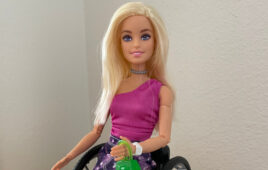
Shelly Torres-West, ATP, is with NSM’s Arlington, Texas, office. An accomplished singer, she’s shown here at NSM’s 2005 symposium.
After more than 30 years in the complex seating & mobility business, National Seating & Mobility’s (NSM) Shelly Torres-West is retiring at the end of the year. Here, she looks back and also forward. — Ed.
q: What made you decide to retire in December?
a: I came to this decision because of all the funding issues. There’s so much stress now in this field. We never had these levels of stress when we could make our own stuff and be more creative instead of having to buy things. We would just create our own stuff . But then we had stop doing that because of liabilities, which makes sense.
I won’t miss the paperwork at all, and now there’s so much stress with trying to get your paperwork in on time. No matter what your vision is, the bottom line is always the dollar in this business. That’s just the way it is. It’s got to be that way to run a business, and I understand that. If I were a manager or owner, I’d probably give the shop away; I don’t think I’d be too successful!
q: Has the funding environment hindered your ability to be as creative as an ATP?
a: Somewhat, because there are things that are really expensive. There are manufacturers that will make you almost anything you want, but it costs. It costs in research, it costs to tool up for it, it costs to create the parts, and it costs to pay their engineers. It comes at a price.
It’s hard to get not only the consumers to understand why this stuff is so expensive, but also the funding sources, for them to understand the research and development that goes into it.
If it were up to me, every person on Capitol Hill and every person in every state capital in the country would have a handicapped child at home for one week with no equipment to help them. Then they might get the picture.
q: Has the percentage of time that you spend doing documentation and paperwork drastically increased in the 30 years you’ve been in this field?
a: I have to say yes, it’s changed, but I don’t know that I can put a finger on a number. It’s been so gradual. I was trying to think back to the days before the laptops and the iPads, when I used to go to IHOP and sit there and drink coff ee and do paperwork for a couple of hours.
There are people that say, “Don’t think of the funding, think of the client first. Think about everything you want for that client, and then fight for it.” Idealistically, that’s what I would like. That’s what we all would like. We all want to give our clients whatever they need to help their situation. Unfortunately, too many other people have given clients everything they don’t need. And so it’s kind of ruined it for the rest of us.
q: You’ve worked with Sara Moore, ATP, also with NSM, for a long time, even before you two started your own seating & mobility company called Adapted Systems Unlimited. What kept you going?
a: We loved what we were doing. We were helping people. We could try things people hadn’t tried before. We would brainstorm and come up with some really fun stuff . To be able to help people, it was something that we both loved to do. It wasn’t so much a business as it was a passion.
q: So where do you go from here? How will you be spending your retirement?
a: Some nights and weekends, I’ll be singing. More and more singing jobs are coming my way, so it’s awesome.
I’ve applied for my Social Security, and I’m going to drive a school bus. I’ll be done at 8:30 in the morning, and I don’t have to be back to drive again till 2:30 in the afternoon. During that time, I have another business that I do called Legal Shield. It’s an exciting business; it also helps people.
I also want to start The Helmet Project, where every NSM office would have a fit kit. You get a helmet for a kid, but the helmet doesn’t fit because you didn’t have a fit kit. Then you have to ship it back and get the right size, and then there goes your profit.
It’s hard to get the funding for anything extra, so I want to start a project where eventually I’ll be able to fund the helmets. Whatever Medicaid won’t pay for, my group will make up the difference so the kid will actually get the helmet they need without the headache. There’s hardly any profit in a helmet, but it’s something kids desperately need. And a lot of vendors either get it and eat the cost, or they won’t get it. Because I’ve had so many issues with the helmet situation, I see a need. I think a lot of problems could be solved by having a fit kit.
q: So, you’ll still be working with kids, but as a school bus driver. And what happens the first time you see a child in a wheelchair and you notice his seating or positioning isn’t quite right?
a: I’m gonna work on it! (Laughs.) You have to be careful in a situation like that. I would probably send a note home to the parents and tell them to contact their vendor.

